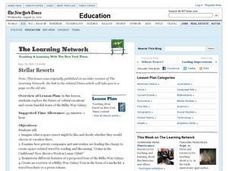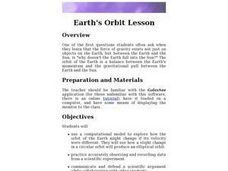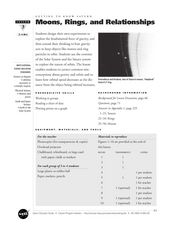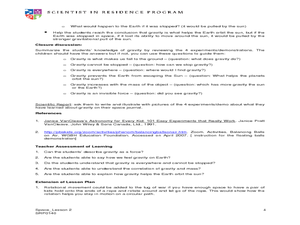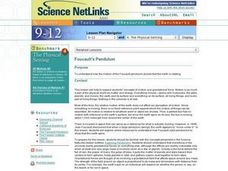Curated OER
Keep In Touch: Communications and Satellites
Fourth graders explore communications by reading assigned space science text. In this satellite lesson, 4th graders identify the concept of orbiting and examine gravitational pull by viewing diagrams. Students are assessed based on...
Curated OER
Stellar Resorts
Students explore the future of "orbital vacations" and create fanciful tours of the Milky Way Galaxy. Students respond to the following prompt in their journals "Entrepreneurs are currently designing concepts for accommodating tourists...
Curated OER
Our Moon
In this space science activity, students use the clues given at the bottom of the sheet to solve the crossword puzzle on our moon. They name another name for the moon and the moon's gravity compared to that of the earth.
CK-12 Foundation
Clarke's Dream
How does satellite TV keep a steady stream when the earth and the satellite are constantly moving? Scholars use a simulator to adjust the radius of orbit of a satellite around the earth. They view graphs of acceleration and time period...
American Museum of Natural History
What is Astronomy?
Go study the universe. Pupils learn seven aspects about astronomy and astronomers. They begin to learn about constellations; distance and motion between objects; gravity; the electromagnetic spectrum; dark matter and energy; and teams of...
Curated OER
Sun too close? We'll just change Earth's orbit
Pupils study an article and discuss what would happen if the Earth's orbit changed. In this Earth's orbit instructional activity students answer a list of questions and complete an activity.
Curated OER
Earth's Orbit Lesson
Tenth graders devise a computational model to explore how the orbit of the Earth might change if its velocity were different. Using accurately recorded data, 10th graders defend a scientific argument.
Vosonos
Interactive Minds: Solar System
Travel through space as you learn about the galaxy, solar system, planets, and much more. An extensive resource for studying astronomy in upper-elementary and middle school classrooms.
NASA
Christa's Lost Lesson: Effervescence
How are chemical reactions affected by gravity? Learners explore the phenomenon of effervescence as part of the Christa's Lost Lessons series. They compare findings in an experiment on effervescence to a video of a similar experiment in...
American Museum of Natural History
Train of Thought
Hop aboard the train of thought. A remote learning resource has learners consider thought experiments to consider scientific theories. It provides two examples, one on orbiting bodies and the other on the speed of light, for them to work...
Curated OER
Universal Gravity and Kelper's Laws Worksheet
High school physicists apply their knowledge of planetary motion. Using Kepler's three laws, Newton's law of universal gravitation, and the provided properties of the moon, sun, and Earth, they proceed to solve 23 problems. An answer key...
Curated OER
TE Activity: A Roundabout Way to Mars
Students investigate Hohmann orbit transfers using cardboard and string while focusing on the orbits of Earth and Mars. They look at the planets orbits around the sun and transfer orbit form one planet to another to determine what a...
Curated OER
Who Wants to be a Millionaire? Solar System
Fifteen questions about our solar system make up this interactive review game. It was written by a teacher in the UK, and therefore the monetary winnings for answering correctly are in pounds. The content applies, however, to any...
Curated OER
Newton's Universal Law of Gravitation with Simple Machines
First graders engage in a lesson that is about Newton's Laws Of Gravitation while conducting research in order to perform an information search. They sing a song about the Law of Gravitation and play a game of Ring Around The Rosie. Then...
Curated OER
Break the Code: Astronomy
Here is a quick puzzle-style activity for your aspiring astronomers. A code is printed at the top of the page and learners use it to fill in the blanks describing different phenomena or objects in outer space. The material does not even...
Curated OER
Earth, Moon, and Sun
In this earth, moon, and sun orbits worksheets, students will read the cause of four different events that focus on the earth's rotation around the sun and the moon's rotation around the earth. Then students will write in the effect of...
Curated OER
Getting to Know Saturn: Moons, Rings, and Relationships
Students identify the different objects that orbit Saturn. In this space science lesson, students plot the graph of orbital speed and distance. They explain why planets and asteroids remain in orbit around the sun.
Curated OER
The Mass of the Moon
In this mass of the Moon worksheet, students use the lunar orbit and the orbit period to determine the mass of the Moon. They solve 4 problems including finding the mass of the Moon, determining the ratio of the Moon's mass to the...
Curated OER
Gravity - The Glue of the Universe
Students explore physics by conducting a class experiment. In this gravitational force lesson, students define several scientific terms associated with force. Students utilize a styrofoam cup and marbles to simulate a satellite crashing...
McGraw Hill
Escape Velocity Interactive
How hard do you need to throw a ball in the air so that it never returns? Scientists call this measure the escape velocity. Classes can explore this concept through an intriguing interactive lesson. Pupils adjust velocities and observe...
Curated OER
Saturn’s Moons
Young scholars compare Saturn's moons to the Earth's moon. In this moon lesson students work in groups and complete a lab activity then answer questions.
Curated OER
Foucault's Pendulum
Students investigate how the motion of the Foucault pendulum proves that the Earth is rotating. They research the Internet about pendulums and conduct an experiment online. They view a multimedia presentation about pendulums and read...
Curated OER
Science
Learners study God's plan and how it works in the universe. This is a religious instructional activity where pupils divide into groups. Each person is assigned a job within the group, such as researcher, visual presenter, oral presenter,...
Curated OER
How Can a Spacecraft Always Face the Sun?
Students determine the correct orbital path for a satellite that collects data about the sun so that its view of the sun never be obstructed by the Earth.



